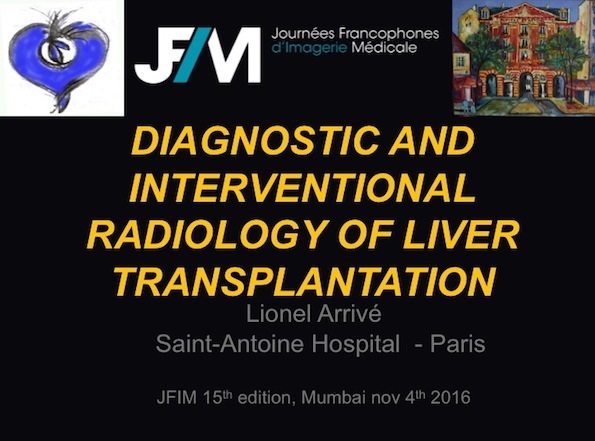
MUMBAI India
President and co-President: Dr. Shrinivas Desai and Dr. Luc Rotenberg.
Program organizers: Dr. Vimal Someshwar, Dr. Gireesh Warawdekar. Scientific organizers: Pr. Christine Hoeffel, Dr Rochan Pant, Dr. Suyash Kulkarni and JFIM scientific committee.
Academic partners: ISVR (Indian Society of Vascular and Interventional Radiology), FRI (French Fédération of Interventional Radiology) and ECP (European Cancer Prevention).
International Radiology Updates Abstracts
Mumbai, 3rd -6th November 2016
Liver and Biliary ducts
Chairmen: Dr Deep SHRIVASTAVA, Pr Jean Michel TUBIANA, Pr Christine HOEFFEL
Interventional radiology in CHC management has become essential. Ablation techniques and chemo-embolization complement each other and are involved at all stages of the disease. We will review techniques and indications. The meeting will also simulate multidisciplinary discussions based on selected clinical cases to highlight the role of interventional radiologists in oncology.
Breast and soft tissue interventions
Chairmen: Dr Sushma THAKUR, Dr Jean GUIGUI, Dr Sophie TAIEB, Dr Luc ROTENBERG
Interventional radiology has an increased role in diagnostics but also in treatment of breast lesion. Many techniques are now available to obtain relevant samples for each case by large core or vaccum breast biopsy. If open surgery remains the common approach in 2016 for malignant lesion, several benign lesions and border lesions benefit from nonsurgical removal procedure without further surgery.
Kidney and urology
Chairmen: Dr Shrikant KOTHEKAR, Pr Patrice TAOUREL, Dr Shrikant KOTHEKAR
Percutaneous treatment of kidney and retro-peritoneal lesions has developed in recent years due to guiding ablation techniques improved efficiency broadening recommendations and indications. Renal transplantation complications are managed by interventional radiology and more recently benign prostatic hyperplasia can benefit in some cases from nonsurgical techniques such as ablation and endovascular embolization.
Cardiac and Thoracic
Chairmen : Dr Sanjeev SHARMA, Pr Gilbert FERRETTI, Pr Ph C DOUEK, Dr Suyash KULKARNI
Chest pathology is a traditional field of vascular and interventional radiology. Development in trans-thoracic biopsies and lung parenchymal ablation now offer alternative care to open surgery. Arteriovenous malformation embolization and management of endovascular lesion or ruptured aneurysms will also be addressed in this session.
MSK interventional and pain management
Chairmen: Pr Jean Denis LAREDO, Dr. Shrinivas DESAI, Dr Aditya DAFFTARY, Pr Catherine CYTEVAL
Management of primary and metastatic bone lesions uses more and more sophisticated interventional techniques for their ablation and acute and chronic pain management. The various techniques, their characteristics and indications will be addressed during this session.
Vascular Interventional
Chairmen: DR RAMAMOORTHY, Pr Louis BOYER, Pr Jean Michel BARTOLI, Dr Vimal SOMESHWAR
Vascular pathology is one of the first fields to benefit from radiological interventional techniques. Treatment of stenosis or arterial aneurysms by endovascular path, arteriovenous malformation or fistulas and their complications will be discussed during this session with a focus on acute and chronic mesenteric ischemia. Finally, a new promising technique of haemorrhoids embolization will be presented to close the congress.
RESOURCES - MUMBAI
New Delhi, India
Slides –Mumbai 2016
La Rochefoucauld, France
Slides –Mumbai 2016
Lille, France
Slides –Mumbai 2016
Montpellier, France
Session –Mumbai 2016
Bordeaux, France
Webinar –Mumbai 2016













